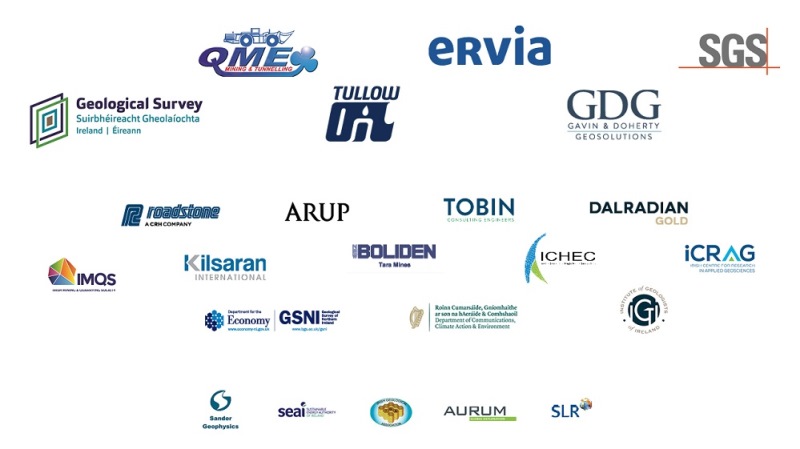The 63rd Annual IGRM hosted by Geological Survey Ireland
Programme:
The weekend will open with a reception on Friday, 6pm followed by the first of our guest lectures at 7pm. Saturday will include a full day of talks and poster presentations with our second evening lecture followed by a short reception and annual dinner. The talks and poster session will conclude on Sunday with the presentation of the prizes for Best Student Talk and Best Student Poster.
- The programme and speaking schedule is now available for download here. (Printed copies will be available at registration)
- The full programe including abstracts can be found here (46 pages).
- The full programme and abstracts as an interactive pdf can be found here. (To read this file you will need a suitable reader such as Apple books app, Chrome Readium, GooglePlayBooks or Moon+ Reader).
Winners of student prizes
Congratulations to the following and many thanks to the Irish Geological Association for sponsoring the student prizes.
Posters (Undergrad):
- 1st Prize: Elizabeth Andres
- Runner up: Sam Irwin
- Commendations: Cilian Barry, Ciaran Tierney
Posters (Postgrad)
- 1st Prize: Aileen Doran
- Runner up: Laura Berdi
- Commendations: Summers, Oliveira, Strachan, Behboudi
Talks
- 1st Prize: Luke O'Reilly
- Runner up: Hilde Koch
- Commendations: Daniel Falk, Michelle Curran, David O'Leary, Brydon Lowney, Emma Kovacs
Registration:
The meeting is free to attend however registration is required through our eventbrite page.
http://igrm2020.eventbrite.ie
Dietary requirements
If you have any dietary requirements that we should be aware of please email research@gsi.ie
Guest Speakers
Friday Feb 28th, 7pm | Prof. Katherine Cashman, University of Bristol
The 1980 eruption of Mount St. Helens: a 40-year perspective The 1980 eruption of Mount St. Helens changed the study of volcanic processes, hazards and risk in many important ways. From the perspective of 40 years later, what happened in 1980, and how have approaches to volcanic studies have evolved from this starting point. Given our current understanding of volcanic systems, and how that understanding has evolved, and continues to evolve, what have we learned from (1) key eruptions around the world and (2) critical advances in technology.
Saturday Feb 29th, 6pm | Prof. Mark Williams, Univeristy of Leicester
The geological Anthropocene is realPeople have become agents of global geological change. Each year we move much more sediment than all of the world’s rivers, use enough freshwater to drain the African Great Lakes Malawi and Victoria dry, add billions of tons of carbon dioxide to the atmosphere, and use more than 500 exajoules of energy from primary resources like oil, gas and coal. Humans have reshaped the global pattern of life, translocating plants and animals beyond their natural ranges, appropriating much of the energy produced by plants, and concentrating mass in a small range of organisms – 7.7 billion humans – and their commensal organisms like chickens, cows and maize. Whilst the fossil record of archaic humans extends back nearly 3 million years, for much of that time patterns of human influence were regional, beginning in Africa, and only over many tens of thousands of years expanding throughout the world to leave behind a time-transgressive fossil signature, mostly of artefacts, but later including translocated species and patterns of organism extinction. However, from the mid-20th century onwards the accelerating signature of human global consumption can be demarcated by the spread of, for example, plastics, radiogenic isotopes from nuclear detonations, fly ash from thermal power stations, invasive species such as the giant African snail or Pacific oyster, and the globally traded materials that build our modern cities. These leave a clear and distinctive geological signature of human over-consumption of Earth resources, and of a geologically distinctive Anthropocene.
Abstract submission:
Abstracts will be accepted until 24 January and must be submitted as per the instructions and template which you can download here. If this link does not work, please contact research@gsi.ie for the word file.
Submission of an abstract is not registration – registration must be done separately via the Eventbrite link above.
Parking at the Radisson
There is limited parking at the hotel. Although this is pay and display, this will not be in effect for the duration of the confernece so please do not pay on site. To ensure you car is not accidently clamped please give your registration details to the reception desk on arrival.
Accommodation:
A block of rooms have been reserved in the hotel and will be held until one month before the event, please used the reference IGRM2020. Single rooms are €129 per night and double rooms are €139 per night when booking directly with the hotel.
Other hotels within walking distance include the Prince of Wales Hotel, the Sheraton Hotel and the Shamrock Lodge Hotel plus a number of B&Bs and apartments.
Thanks to our sponsors:

Queries regarding the meeting to research@gsi.ie